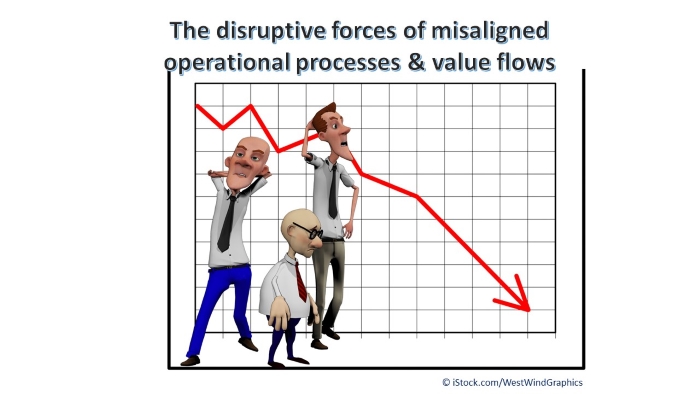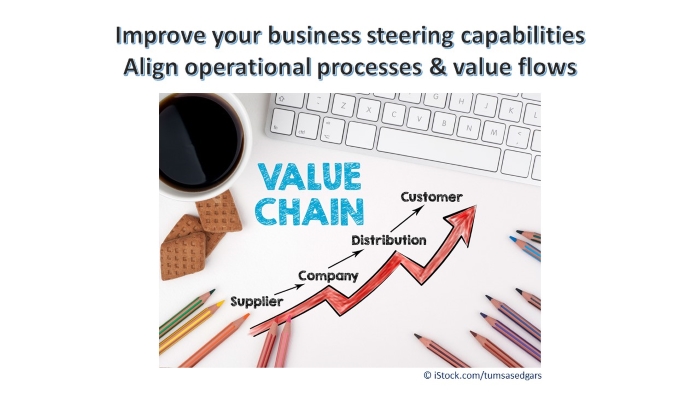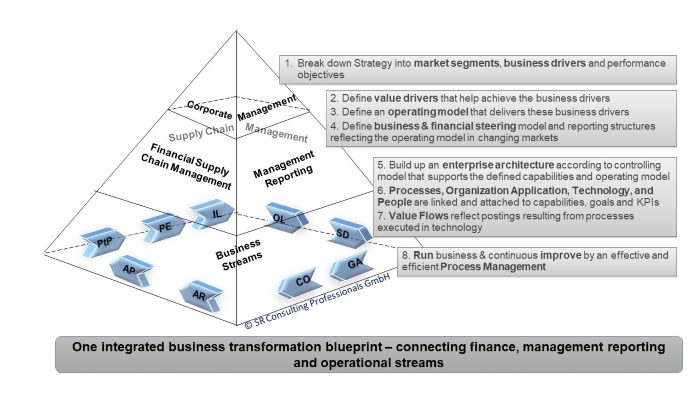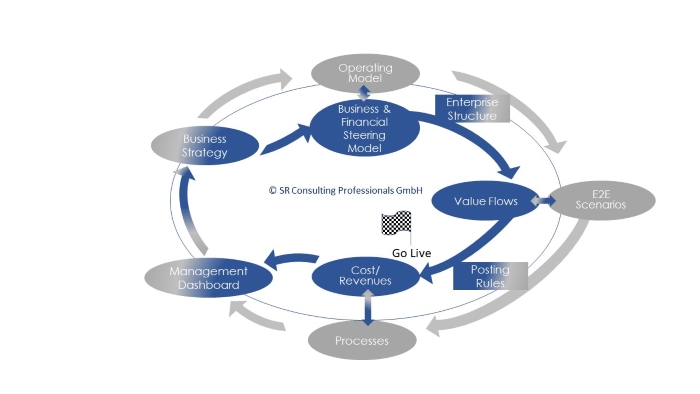The disruptive forces of misaligned operational processes & value flows
Challenge: "How to foster seamless business steering through harmonisation of operating models, value flows and management reporting while ensuring business flexibility to react quickly on changing market requirements?"
Sabrina Reitz/ Ikemefuna Allen
The situation
Business transformation, in essence, focuses on fundamentally changing processes, systems, roles and technologies across the entire organisation. Such initiatives are founded on the hopes of achieving measurable improvements in efficiency, effectiveness and stakeholder satisfaction. Naturally, the decision to enact business transformation must be based on a sound understanding of the required changes, how to implement them, and what the implications are once they are implemented. It is imperative to take an embracing approach involving and ensuring alignment between all the stakeholders impacted.
Experience shows that this is hardly the case, with disjunct and misaligned efforts from the two worlds of Operations, and Finance & Controlling. Typically, accounting departments are left in the dark about business operations during process design phases of major transformation initiatives, while professionals from purchasing, production planning, and sales & distribution often seem not aware how their business operations impact accounting.
What follows
The far reaching consequences of misalignment between Operations and Finance & Controlling have been felt at all stages of major business transformation initiatives across many industries. Areas impacted range from process design and systems testing through to hyper-care and running the daily business. To demonstrate this, we revert to some use cases from major business transformation projects, and show how things went wrong. The examples demonstrate how an apparently isolated problem can have impacts far beyond the radar of those responsible for implementing and championing the change.
Case 1: Misalignment between procurement, logistics, and accounting impacts system testing
Because involvement of local tax and finance departments into the project happened too late, the entire procurement process for certain materials had to be redesigned during testing phase. While making up for this, realignment across all related streams resulted in extra effort and a high potential risk of delays in go-live dates.

Case 2: Misalignment between production, procurement, and accounting during process design phase impacts process execution during hypercare
The weighting step that is executed by a subcontractor was part of a recipe. During the process design, the production team only focused on processes relevant for core business. Therefore, the weighting process was not designed and consequently not configured in the ERP system. There was no account assignment. This problem was noticed during hypercare when the process had to be executed. As a result, no sales order could be created. Compounding the problem was the fact that there was no process concept. The whole life cycle of the process had to be adjusted within a productive environment.
Case 3: Misalignment between sales and accounting during process design phase impacts process execution during daily business
Sales of products to employees where not foreseen, and consequently not discussed during the process design phase with accounting. Sales typically only focused on core business. In the newly implemented productive ERP system, it was unclear how to execute the transaction “sales of products to employee” and how to invoice return for production unit and cost for sales shop.
Case 4: Misalignment between logistics, procurement, and accounting during process design phase impacts process execution during daily business
Assignment of logistic expenses to the right positions are critical from an accounting point of view. These involve cost of distributors. Incorrect valuation of cost of sales, cost of production, and time of sales recognition poses a compliance risk involving tax authorities. This can also have COPA impacts (COGS vs Production Costs), causing dissatisfactions of responsible executives in case of variable salaries. During a business transformation project, there was a lack of knowledge on two sides. Logistics was unaware about the fact that such regulation exists, and accounting unaware about different type of contracts SCM had with its business partners. This problem was noticed during daily business, i.e. after go-live and hypercare.
The way Out
SR Consulting Professionals has the methods, skills and end-to-end knowledge and experience to integrate processes, organizations, applications and data for business value creation. In combination with powerful tools and procedures for efficient business planning and reporting, this framework uncovers market changes and supports the quest for continuous business improvement. We combine comprehensive expert skills in financial and management accounting with deep knowledge on business core processes. Over decades we have developed a process-centric consulting framework to accelerate value driven business transformation. It provides the methodology, supporting tools and a knowledge framework which can be used as reference and accelerator to setup flexible reporting structures and effective steering procedures for sustainable business success.
Improve your business steering capabilities
Based on our consulting framework and the profound insight of our partner bpExperts in the manufacturing industry, we have developed a concise and pragmatic methodology for representing both value adding activities and their finance & controlling impacts.

The solution approach
Value Driven Business Transformation ensures seamless process design and systems implementation through early alignment between operations and Finance & Controlling on key aspects of the business including financial steering, operating models, end to end scenarios and value flows. To accomplish this, SR Consulting Professionals and BP Experts have developed an integrated approach that couples the separated views of operations and accounting. This integrated and aligned business transformation approach allows business steering through harmonization of operating models, value flows and management reporting.

Business strategy forms the basis for aligning the operating model with the business & financial steering model. At this early stage, stakeholder from both Operations & Finance & Controlling come together and detail the future enterprise set-up. Based on the defined E2E scenarios and processes, posting rules are derived for the allocation of value flows.
- Process specifies the interaction of people and systems when executing business operations.
- Value flow is the set (scope) of postings resulting from business operations
- Posting rules are business requirements on how the system is to be configured in order to reflect the business & financial steering model in the context of a given enterprise structure

Deliverables
- Business & Financial Steering model
- Enterprise structure
- Value flows
- Posting rules
In Summary
An Integrated business transformation blueprint bridges the gap between finance, management reporting and operational streams during business transformation initiatives. In partnership with bpExperts, we have a comprehensive consulting offering including domain expertise, proven consulting approach and dedicated methodology. In addition, our consulting framework and business flow reference model of bpExperts provides accelerators which help kick-start your initiative.
